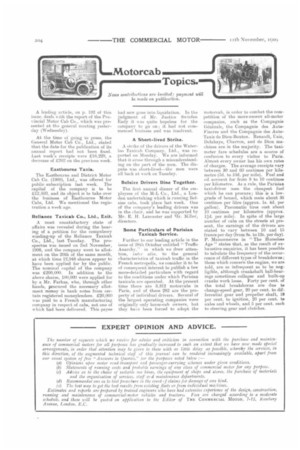Motorcab Topics.
Page 14

If you've noticed an error in this article please click here to report it so we can fix it.
News contributions are invited: payment will be niade am pub/ire/ion.
A leading article, on p. 192 of this issue, deals with the report of the Provincial Motor Cab Co., which was presented at the general meeting yesterday (Wednesday).
At the time of going to press, the General Motor Cab Co., Ltd., stated that the date for the publication of its annual report had not been fixed. Last week's receipts were 1.ei,229, decrease of £202 on the previous week.
Eastbourne Taxis.
The Eastbourne and District Motor Cab Co. (1909), Ltd., was offered for public subscription last week. The capital of the company is to be £12,500, and its object is to take over the business of Eastbourne Motor Cabs, Ltd. We mentioned the registration a week ago.
Reliance Taxicab Co., Ltd., Exit.
A most linsatisfactory state of affairs was revealed during the hearing of a petition for the compulsory winding-up of the Reliance Taxicab Co., Ltd., last Tuesday. The prospectus was issued on 2nd November, 1908, and the company went to allotment on the 20th of the same month, at which time 12,948 shares appear to have been applied for by the public. The nominal capital of the company was £200,000. In addition to the above shares, 100,000 were applied for by a Mr. Farkas, who, through other hands, procured the necessary allotment money in bank notes from certain registered moneylenders. £20,000 was paid to a French manufacturing company in respect of cabs, not one of which had been delivered. This payee had now gone into liquidation. In the judgment of Mr. Justice Swinfen Eady it was quite hopeless for the company to go on; it had not commenced lmsiness and was insolvent.
A Short-lived Strike.
A strike of the drivers of the Waterloo Taxicab Company, Ltd., was reported on Monday. We are informed that it arose through a misunderstanding on the part of the men. The dispute was short-lived—the men were all back at work on Tuesday.
Belsize Drivers Dine Together.
The first annual dinner of the employees of the M-L Co., Ltd., a London undertaking which is running Belsize cabs, took place last week. One of the company's leading drivers was in the chair, and he was supported by Mr. E. H. Lancaster and kir. Miller, directors.
Some Particulars of Parisian Taxicab Service.
Further to our leading article in the issue of 28th October entitled " Traffic Anarchy.'' in which we drew attention, Orr olio, to the general eharacteristics of taxicab traffic in the French metropolis, we consider it to be of consequent interest to publish a few JILore-detailed particulars with regard to the oonclitions under which Parisian taxicabs are operated. At the present time there are 3,312 motorcabs in Paris, and of these 282 are the property of individual drivers. Several of the largest operating companies were originally only horse-cab owners, but they have been forced to adopt the mown% b, in order to combat the competition of the more-recent all-motor companies, such as the Compagnie Generale, the Compagnie des Autonacres and the Compagnie des AutoTaxis de Dion-Bouton. Renault, 'link, Walleye, Charron, and de Dion machines are in the majority. The taximeter fare schedules are a source of confusion to every visitor to Paris. Almost every owner has his own rates of charges. The average receipts vary between 30 and 00 centimes per kilometre (5d. to 10d. per mile). Fuel and oil account for from 8 to 10 centimes per kilometre. As a rule. the Parisian taxi-driver uses the cheapest fuel which he can procure; this is a lowgrade of benzol, which costs about 35 centimes per litre (approx. is, 4d. per gallon). Pneumatic tires cost about 10 centimes per kilometre (approx. 1N. per mile). In spite of the large number of cabs on the streets at present, the earnings of the drivers are stated to vary between 10 and 15 francs per clay (from 8s. to 12s. per day). P. Maisonnenve in 'The Horseless Age" states that, as the result of exhaustive enquiries, it has been possible to tabulate the frequency of the occurrence of different types of breakdowns; those which concern the engine, we are told, are so infrequent as to be negligible, although crankshaft ball-bearings sometimes collapse and built-up cranks work loose. Forty per cent. of the total breakdowns are due be change-speed gear, 20 per cent. to differential gear and propeller shaft, 13 per cent. to ignition, 20 per cent. te axles and wheels, and 5 per cent. each to steering gear and clutches.






















